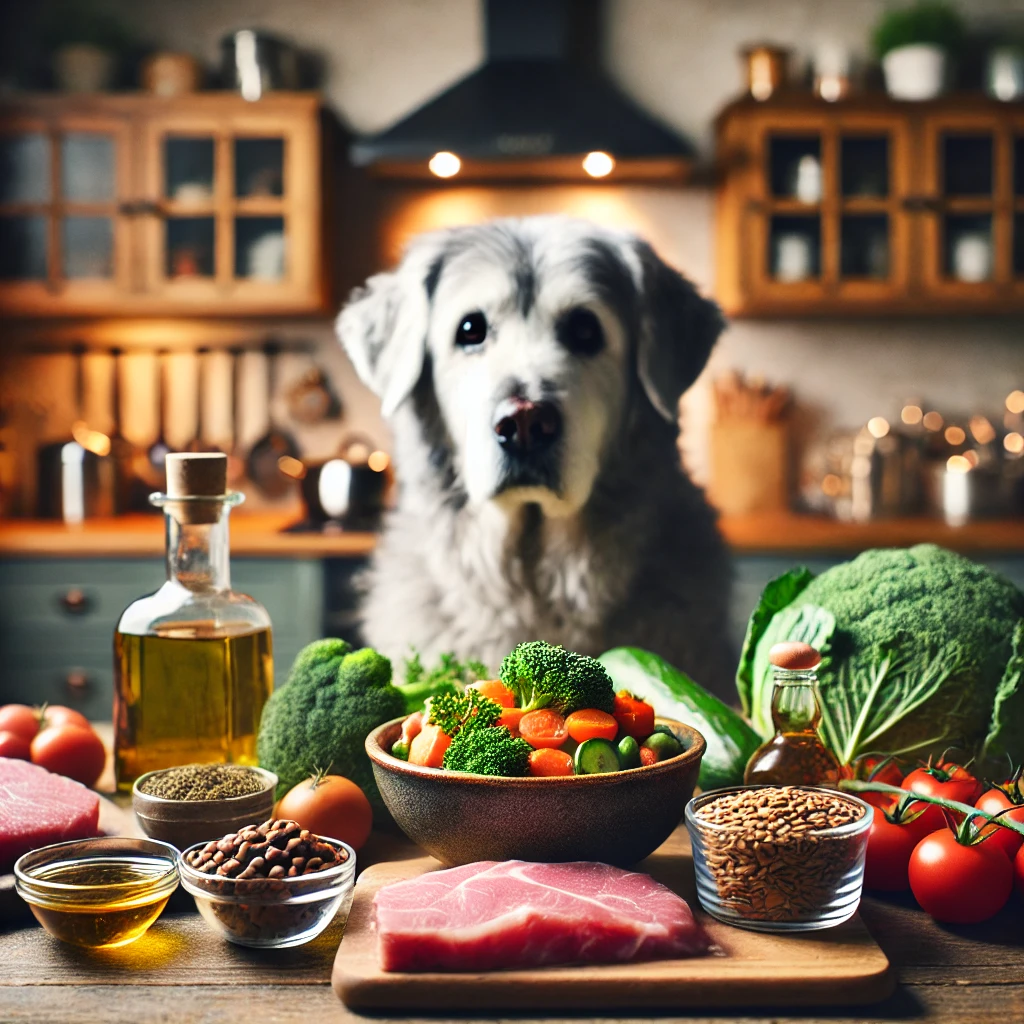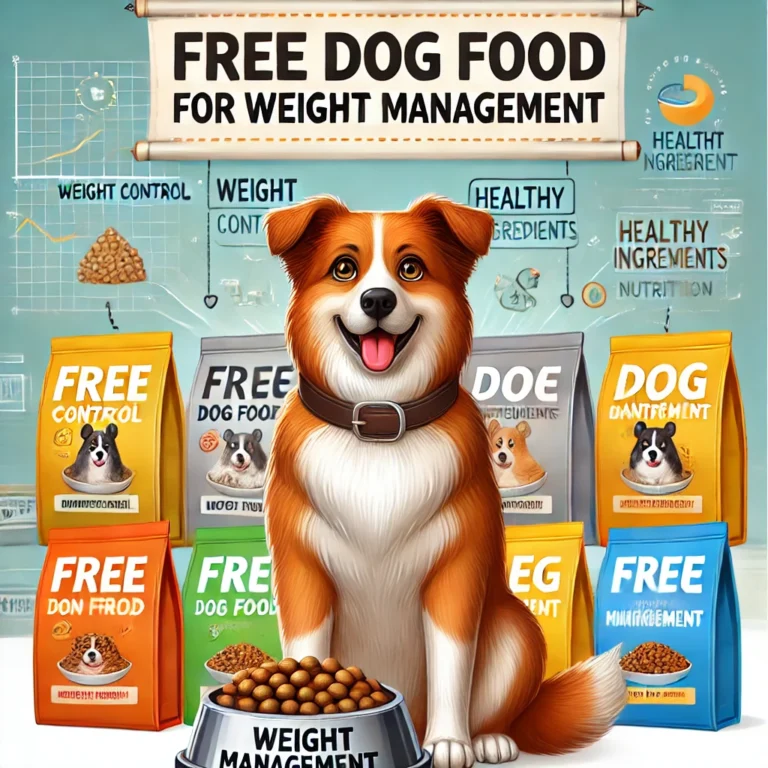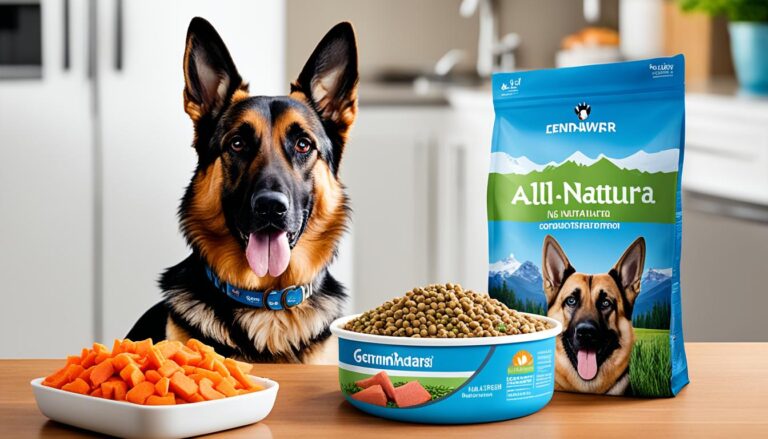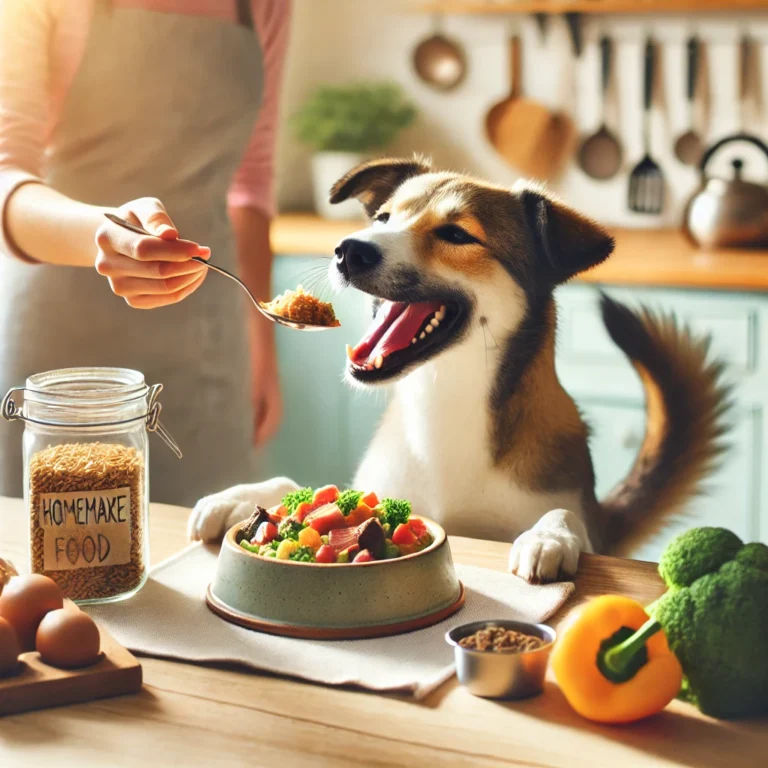Best Diet for Senior Dogs
As dogs grow older, their nutritional needs change. You can’t feed an older dog the same food you gave them as a puppy. Senior dogs need a special diet to stay healthy in their golden years. This guide will help you understand what to feed your aging pup to keep them happy and healthy.
1. Protein

As your dog gets older, their nutritional needs change, and protein becomes even more important. Protein helps maintain lean body mass, supports the immune system, and aids in cellular repair. Older dogs might need more protein because they can lose muscle mass as they age.
It’s crucial to choose high-quality protein sources, preferably from animals. Animal proteins are easier for your dog to digest and provide the essential amino acids they need. Look for dog foods where protein is one of the first ingredients listed.
Remember, while high-protein diets are generally safe for healthy senior dogs, it’s a good idea to check with your vet, especially if your dog has kidney issues.
2. Fats

Fats are super important for your senior dog’s diet. They add flavor to meals, making them more appealing. But remember, moderation is key. Older dogs can gain weight easily because they don’t need as much energy as younger pups.
- Omega-6 fatty acids: These are great for healthy cell growth, shiny coats, and keeping the skin’s oils balanced.
- Omega-3 fatty acids: These help reduce inflammation, which is super helpful for dogs with arthritis.
- Medium-chain triglycerides (MCTs): Found in coconut oil or palm oil, MCTs can be added to your dog’s food to give them an extra boost.
Not all fats are bad. The right fats can actually help your dog stay healthy and happy as they age.
3. Vitamins and Minerals
As your dog ages, their need for certain vitamins and minerals changes. Micronutrients like calcium aid bone health, potassium fights heart disease, and phosphorus is crucial for energy metabolism. It’s not just about the amount; how well these nutrients are absorbed matters too. Foods with highly bioavailable minerals should be preferred.
If you’re worried your older dog isn’t getting the right balance of vitamins and minerals, you can also give them as supplements. Vitamin E acts as an antioxidant supporting immune function, whereas B vitamins help prevent kidney disease prevalent in elderly pooches. Additionally, higher levels of vitamins C and E can reduce inflammation and promote a healthy immune system, skin, and coat.
A variety of vitamins and supplements are geared towards senior dogs. Options include multivitamins, antioxidants, amino and fatty acids, prebiotics, and probiotics. Each one offers unique advantages. For example, Omega-3 and Omega-6 promote skin and coat health while also supporting bones and joints. Additional options for bone and joint health include glucosamine and vitamin K.
It’s not just about giving your older dog less food, but the right kind. They need a diet packed with high-quality protein and low in fat, alongside just-right amounts of crucial nutrients.
4. High-Quality Ingredients
Your senior dog deserves the best, and that starts with high-quality food. It’s not just about filling their belly, but choosing a diet that supports their health as they age.
When picking out food, always check the ingredient list. It should be filled with recognizable foods rather than hard-to-pronounce chemicals. Look for high-quality proteins and farm-fresh fruits and vegetables. These ingredients are not only nutritious but also easier for your aging pup to digest.
- Proteins: Make sure the food includes animal protein sources. These are easier for your dog to digest and provide essential nutrients.
- Fruits and Vegetables: Fresh or frozen green beans, carrots, cucumbers, broccoli, and lettuce are great options. They are low in calories and make good, guilt-free snacks.
- Avoid Fillers: Stay away from foods with fillers like corn, wheat, and soy. These ingredients offer little nutritional value and can be hard on your dog’s digestive system.
Choosing the right ingredients can make a noticeable difference in your dog’s health and happiness. Always opt for quality over quantity to ensure your senior dog enjoys their golden years.
5. Balanced Diet
A balanced diet is super important for your senior dog. It’s not just about protein; you also need to think about carbs for energy and fiber to keep your dog regular. Make sure there are plenty of veggies included too. Treat your dog by occasionally adding green beans, carrots, or sweet potato to their dinner.
Health Goals
- Healthy Digestion
- Skin + Coat Support
- Healthy Weight
- Joint Health
- Kidney + Liver Support
Needs
- Picky Eaters
- Novel Protein
- Vet Support
- Custom Diets
Balanced diet is key to keeping your senior dog happy and healthy. It’s not just about giving them less food, but the right kind. They need a diet packed with high-quality protein and low in fat, alongside just-right amounts of crucial nutrients.
6. Senior Dog Foods
As your dog gets older, their nutritional needs change. Senior dog food is specially formulated to meet these needs and help your furry friend stay healthy and active. Here are some things to keep in mind when choosing food for your senior dog.
Higher Digestibility
Senior dog food often has higher digestibility, which means it’s easier for your dog to absorb the nutrients. This is important because older dogs have slower metabolisms and may not process nutrients as efficiently as younger dogs.
Quality Protein Sources
Look for senior dog foods that contain high-quality protein sources. Since older dogs don’t process protein as well, it’s crucial to provide them with the best quality available. This helps maintain muscle mass and overall health.
Balanced Nutrition
A balanced diet is key for senior dogs. Make sure the food you choose has the right mix of protein, fats, vitamins, and minerals. This will help keep your dog in good shape and avoid health problems.
Smaller, More Frequent Meals
Feeding smaller, more frequent meals can be beneficial for senior dogs. It helps with digestion and can prevent weight gain. Plus, it can make mealtime more enjoyable for your pup.
Consider Supplements
Sometimes, even the best senior dog food might not provide all the nutrients your dog needs. In such cases, consider adding supplements to their diet. Always consult your vet before making any changes.
Switching to senior dog food can help extend your dog’s life and maintain their health for years to come. It’s a simple change that can make a big difference.
Remember, every dog is different. What works for one might not work for another. Keep an eye on your dog’s health and adjust their diet as needed. Happy feeding!
7. Wet Food
Wet food, usually found in cans or pouches, is a great option for older dogs, especially those missing teeth. Most dogs love the taste and texture of wet food, making it easier to ensure they eat regularly and stay healthy.
However, there are some downsides to consider. Wet food tends to be higher in fat, which might not be ideal for all senior dogs. Plus, it can stick to their teeth, potentially causing dental issues.
A diet that your dog enjoys is more likely to be eaten regularly, helping them stay healthy and vibrant.
8. Dry Food
Dry kibble is a popular choice for many senior dogs. It’s usually lower in fat and helps clean your pet’s teeth as they chew. However, some older dogs may struggle with hard kibble due to missing teeth or reduced jaw strength. Dry food can keep your pet’s teeth clean better and it also stores longer. If your dog has dental issues, you might want to consider mixing wet and dry food to give them the best of both worlds.
When deciding whether to buy wet or dry dog food, know that both types have their advantages and can be beneficial for older dogs depending on their specific needs.
Consult your veterinarian for specific advice. And remember, a balanced diet is key to keeping your aging pup healthy and happy.
9. Mixing Wet and Dry Food
Mixing wet and dry food for your senior dog can offer the best of both worlds. Wet food is tasty and easier to chew, especially for dogs with dental issues. On the other hand, dry kibble helps clean their teeth and is usually lower in fat.
Benefits of Mixing
- Boosts hydration: Wet food has a higher moisture content, which helps keep your dog hydrated.
- Weight management: You can adjust the ratios to control calorie intake.
- Balanced nutrition: Combining both types ensures your dog gets a variety of nutrients.
How to Mix
- Start with a small amount of wet food mixed into the dry kibble.
- Gradually increase the wet food portion if your dog prefers it.
- Monitor your dog’s weight and adjust the ratios as needed.
Mixing wet and dry food can make mealtime more enjoyable for your senior dog while providing essential nutrients and dental benefits.
Tips for Success
- Choose high-quality food with recognizable ingredients.
- Consult your vet for personalized advice.
- Keep an eye on your dog’s calorie intake to prevent weight gain.
10. Monitoring Calorie Intake
Keeping an eye on your senior dog’s calorie intake is super important. Using a measuring cup or scale can help you serve consistent portions every time. Treats are fun, but remember to count them in their daily calories. And, avoid giving table scraps – they often have hidden calories and aren’t made for dogs’ nutritional needs.
Tips to Monitor Calorie Intake
- Use a measuring cup or scale to ensure consistent serving sizes.
- Limit the use of treats. If used, make sure to account for them in their daily caloric count.
- Avoid giving table scraps – they often contain hidden calories and aren’t formulated for dogs’ nutritional needs.
Feed Smaller Meals More Frequently
Vets suggest that feeding smaller meals more often can help with weight control. This is especially important for our less active seniors. A steady intake keeps them from overeating and helps their metabolism work better.
Regular feedings can prevent sudden spikes or crashes in blood sugar levels, which is another win for managing weight healthily.
Regular Weigh-Ins
Once you know how much to feed at each meal, schedule regular weigh-ins at your vet’s office to monitor any weight gain or loss. You can also ask your vet to show you how to get a body condition score from your dog at home.
Conclusion
Feeding your senior dog the right diet is super important to keep them happy and healthy in their golden years. As they age, their nutritional needs change, and it’s up to us to make sure they’re getting the right balance of proteins, fats, vitamins, and minerals. Remember, every dog is different, so what works for one might not work for another. Always keep an eye on their weight, energy levels, and overall health, and don’t hesitate to consult your vet for personalized advice. With the right food and a little extra care, your aging pup can enjoy a vibrant and comfortable life.
Key Takeaways
- Senior dogs need a balanced diet with high-quality protein, low-calorie vegetables, and essential vitamins and minerals.
- Look for dog food that supports digestion and includes added fiber and increased fat for better calorie density.
- Both wet and dry food can be good options, and mixing them might provide the best of both worlds.
- Monitoring your senior dog’s calorie intake is crucial to prevent obesity and maintain a healthy weight.
- Always choose high-quality ingredients tailored to the specific needs of senior dogs.
Frequently Asked Questions
What should I feed my senior dog?
Senior dogs need a balanced diet with high-quality protein, nutrient-rich vegetables, and essential vitamins and minerals. Look for foods specifically formulated for older dogs.
How do I choose the best food for my aging dog?
Choose a food that meets your senior dog’s specific needs. Look for high-quality ingredients, balanced nutrition, and foods tailored for senior dogs.
Is wet food or dry food better for senior dogs?
Both wet and dry foods have their benefits. Wet food can be easier to chew and more hydrating, while dry food helps keep teeth clean. Mixing both can provide a balanced diet.
How can I monitor my senior dog’s calorie intake?
Keep track of your dog’s daily food intake and adjust portions as needed. Consult your vet for advice on the right amount of calories for your dog’s age, weight, and activity level.
Do senior dogs need supplements?
Some senior dogs may benefit from supplements like glucosamine for joint health. Always consult with your vet before adding any supplements to your dog’s diet.
What should I do if my senior dog won’t eat?
If your senior dog refuses to eat, try offering different types of food or warming up their meals. If the problem persists, consult your vet to rule out any underlying health issues.







